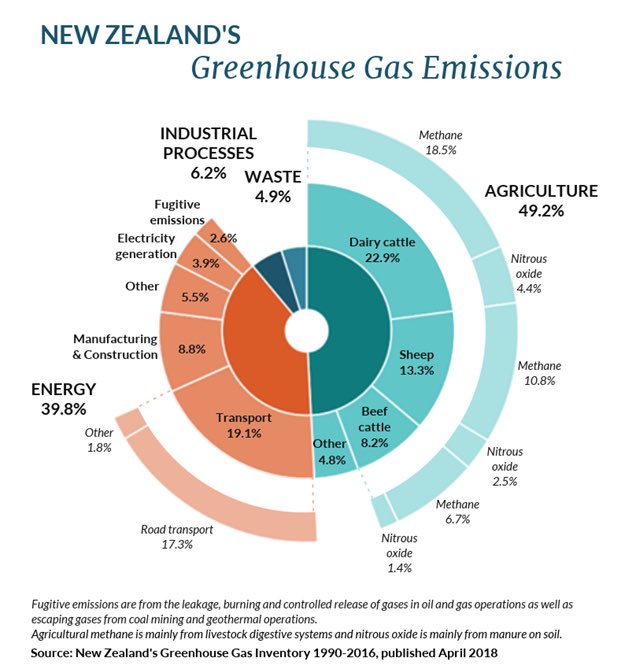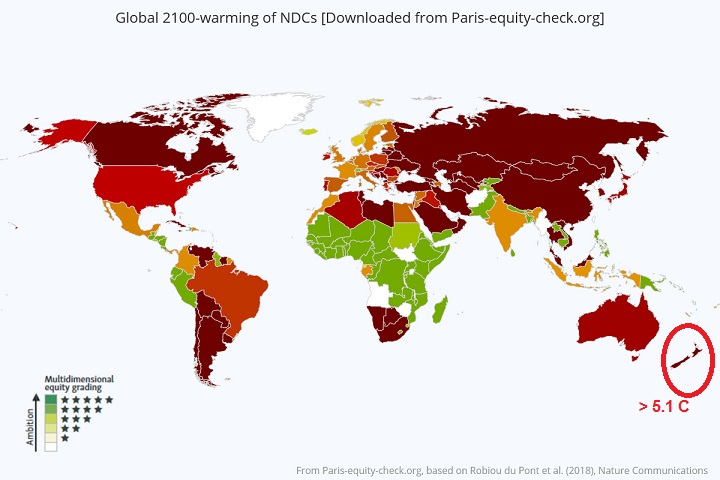In the wake of the IPCC report, it has become clear that we actually need to do something to prevent catastrophic climate change, or
we all burn. Over on
The Spinoff, Alex Braae asks
"what would real climate action [in NZ] actually look like?" There's a couple of suggestions: putting solar panels on kiwibuild homes, banning the import of petrol and diesel cars, rethinking Auckland's waterfront stadium and other high-emissions projects. That's a start, but what would it really look like? To decide that, we need to look at our emissions, both source and size. Fortunately, the Ministry for the Environment has that covered:

The most obvious point to take away from this graph is that reducing agricultural emissions is the key to everything. And most of these emissions are due to exports. NZ
exports 95% of its dairy production, and a similar percentage of its beef and lamb. In other words,
we don't need these emissions to eat - they're just farmers getting rich by destroying the planet. Eliminating these unnecessary emissions would obviously be terrible for the economy -
dairy and meat are our biggest export earners, and their spending supports rural economies - and our methods of production are efficient, carbon-wise, because we grow cows in fields, not barns. So there's an argument that we might want to keep a food export industry. But that would require its emissions to be offset with mass tree-planting (because there is no other magic way of removing carbon from the atmosphere), and as the source of pollution, farmers are going to have to pay for that. So, step one of any action plan is make farmers pay the true cost of their emissions, while regulating the number of farms sharply downwards.
The next biggest segment on the graph is transport. Alex Braae has already suggested the obvious solution: force the transition to electric vehicles with an import ban. I've talked about the specifics of that
here, but its basicly a matter of setting two dates: a cutoff for imports, and a cutoff for (non-historical / narrow permitted uses) registrations. The policy needs to be backed up by tight vehicle fuel efficiency standards in the interim (because the vehicles we import today are going to still be on our roads in 20 years time), and by a massive investment in both urban public transport and long-distance rail (the current government is at least beginning to work on those bits). But we also need to think about the heavy vehicle fleet, which
uses 21% of our fuel (for only ~3.7% of vehicles, so they're disproportionate polluters). Some of these emissions can be eliminated by forcing a modal shift to rail and coastal shipping for long-distance stuff, but to get rid of the rest we either need electric or non-fossil fuel trucks (coming, but not as fast as suburban cars), or to change logistics patterns away from one which sees the food I buy in a supermarket in Wellington trucked down every day from Palmerston North. A rising carbon price might help with this, but if it doesn't seem to be forcing change quickly enough, its worth remembering that we used to
regulate trucking to distances of less than 48 and then 150 km. Applying that sort of restriction to fossil-fuel vehicles (so clean transport is exempt) would force the change we need. Alternatively, there's the option of biofuels (which are carbon-neutral) for heavy vehicles - and that looks necessary for aviation anyway and has significant benefits for other energy uses. NZ has
significant potential to produce biofuel from trees, but getting there would require significant investment to build an industry. Which means the government would have to do it.
Electricity is a small sector, but if we're driving electric vehicles, we're going to need a lot more of it. Here at least the government has made a commitment for 100% renewables (in an average year) by 2035 (building on 90% by 2025), but its important that that be backed by actual policy. Which means using regulation to prohibit dirty generation and relegate any fossil fuels to dry-year backup. It also means a real push to ensure that all future generation we build is renewable: wind, geothermal, solar or hydro. The RMA is a key tool here, and
Labour looks like its going to allow it to be used. There's also an obvious synergy between distributed generation - solar panels on rooftops - and electric vehicles (not to mention summer A/C load, which is only going to increase in a warmer world), so promoting that - and doing it directly using the state housing system - should be a no-brainer.
Industrial, manufacturing and construction are a bit diverse, and some of the solutions are things which come out of things already discussed - process heat needs similar solutions to electricity, and construction similar tools to transport. The rest of the solution is to kill their fuel sources at source: kill oil, and
kill coal. They either go green, or go extinct - because that's the choice facing humanity.
That's the emissions reduction side, but we're also going to have to deal with the effects of the climate change we've already locked in (and which we're feeling now). The most obvious move there is to stop people building on the coast, as the first part of a managed retreat. This will be hugely unpopular - witness the repeated lawsuits by outraged coastal property owners whenever local authorities perform their statutory duty to inform future buyers of flood risks - but if the government doesn't do it, then the insurance industry will make it happen anyway. Because bluntly, they're
not willing to carry the can for people's past stupid decisions. And they can act on this a lot quicker than government can. The danger is that central or local government will face pressure for a bailout of coastal property owners, or to waste money on seawalls to defend the undefendable, all to prop up the inflated wealth or property values of entitled coastal landowners.
One way or another, we are going to have to deal with climate change and adapt to the new world we are making. as Brae points out, we can either choose to manage that transition, or just let it happen to us as a succession of shocks and crises. I would prefer the former. The big concern is that by dragging its feet, our government is heading for the latter.

